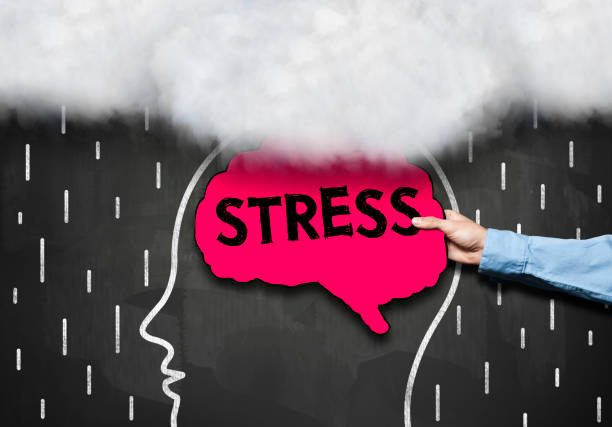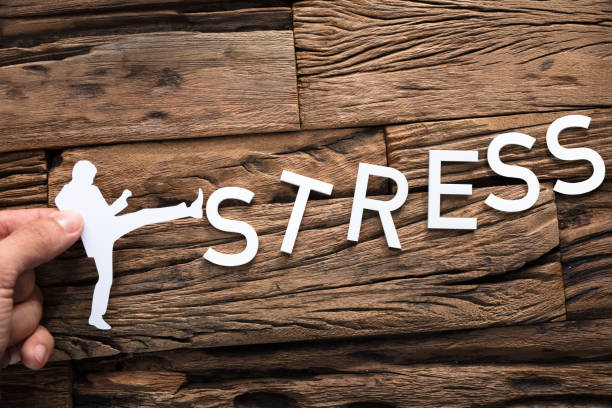Table of Contents
1. Introduction to Stress and the Importance of Reducing It

Stress – The Hidden Enemy of Modern Life
In today’s fast-paced world, stress has become a constant companion for many people. The pressures of work, family responsibilities, social interactions, and even external environmental factors contribute to heightened stress levels. While stress is a natural response of the body to challenges or perceived threats, excessive and prolonged stress can wreak havoc on both mental and physical health. Understanding what stress is and how it impacts our lives is crucial in developing methods to manage and reduce it.
Stress occurs when there is a mismatch between the demands placed on a person and their ability to cope with those demands. When the body experiences stress, it activates the “fight-or-flight” response, releasing hormones such as adrenaline and cortisol. These hormones prepare the body to deal with immediate threats, but when stress becomes chronic, these same hormones can lead to negative health outcomes.
The Impact of Stress on Health and Well-being
Chronic stress can have severe consequences on health, leading to a wide range of issues such as headaches, digestive problems, sleep disturbances, and cardiovascular disease. Research has shown that people who experience prolonged stress are at a higher risk of developing mental health issues such as anxiety and depression. Stress also weakens the immune system, making the body more susceptible to infections and illnesses.
Emotionally, stress can lead to feelings of irritability, frustration, and overwhelm. It can make it difficult to concentrate, reduce productivity, and interfere with decision-making. In relationships, stress often manifests as tension or conflict with loved ones, further exacerbating the emotional toll.
The Importance of Reducing Stress
Given the detrimental effects of stress on overall well-being, it is crucial to prioritize stress management as part of a healthy lifestyle. Learning to manage stress effectively can lead to numerous benefits, including improved physical health, enhanced mental clarity, and more harmonious relationships. Reducing stress helps individuals feel more in control of their lives, promotes a greater sense of fulfillment, and enables them to respond to challenges in a more balanced manner.
In the following sections, we will explore the most common causes of stress and provide practical, effective strategies that you can use to reduce stress and create a more peaceful, energized life.
2. Common Causes of Stress in Daily Life

Stress can arise from various sources in our lives. While each person experiences stress differently, there are several common causes that most people can relate to. Understanding the root causes of stress can help us identify the areas in which we need to make changes or adopt strategies to manage it.
Work Pressure – The Leading Cause of Stress
One of the most significant sources of stress in modern life is work. The increasing demands of the workplace, tight deadlines, competition, and high expectations can easily overwhelm employees. Many individuals feel pressured to work long hours, multitask, or manage several projects at once.
In addition to workload, job insecurity is another stressor that has become more prevalent in today’s economy. The fear of losing one’s job, not being promoted, or not meeting performance expectations can create a constant undercurrent of anxiety.
Work-related stress doesn’t only affect professionals in high-powered jobs; even those in less demanding roles may feel stressed due to conflicts with colleagues, lack of control over their tasks, or unclear job expectations.
Financial Worries and the Cost of Living
Financial stress is a widespread concern that affects people of all ages and backgrounds. Whether it’s managing monthly expenses, paying off debts, or saving for future goals, financial pressures can create ongoing tension.
Unpredictable events such as job loss, medical bills, or economic downturns can exacerbate financial stress, leading to feelings of helplessness or fear about the future. Additionally, the rising cost of living in many parts of the world has placed even greater pressure on individuals and families to stretch their budgets, often at the expense of their peace of mind.
Family and Relationship Tensions
Family life, while often a source of support and joy, can also be a significant source of stress. For many people, balancing family responsibilities with work and other commitments is a constant challenge. Parenting, in particular, can be stressful, with the need to manage children’s education, activities, and well-being while maintaining household harmony.
Marital or relationship conflicts can further contribute to stress. Miscommunication, unresolved issues, and differing expectations in relationships can create an emotionally charged environment, adding to the overall stress load.
Additionally, caring for aging parents or dealing with family crises, such as illness or loss, can cause significant emotional strain. These stressors often compound over time, making it essential to find ways to maintain emotional balance.
Health-Related Stress
Physical health problems can be a major source of stress. Whether it’s dealing with a chronic illness, recovering from surgery, or managing day-to-day health issues like fatigue or pain, health concerns can take a toll on both the mind and body.
The uncertainty of medical diagnoses, fear of future complications, and financial burden of medical treatments can all contribute to feelings of anxiety. Mental health issues such as anxiety, depression, and burnout can also increase stress, creating a vicious cycle where stress worsens mental and physical health, and poor health further heightens stress.
Environmental and External Stressors
External factors such as living conditions, environmental pollution, noise, and crowded spaces can also trigger stress. People living in busy urban areas often face daily stressors such as traffic jams, overcrowded public transport, and noise pollution. These conditions can lead to sensory overload, making it harder to relax or unwind.
Global events such as political instability, pandemics, and natural disasters can also contribute to heightened stress levels. In times of crisis, the uncertainty and fear surrounding external events can deeply affect mental health and well-being.
3. 10 Effective Ways to Reduce Stress

1. Meditation and Yoga: Harnessing the Power of Stillness
Meditation and yoga have long been recognized as powerful tools for reducing stress. Meditation involves focusing the mind on a particular object, thought, or activity to achieve mental clarity and emotional calmness. By practicing meditation regularly, you can train your mind to remain centered and calm, even in the face of stressful situations.
There are various forms of meditation, including mindfulness meditation, transcendental meditation, and loving-kindness meditation. Mindfulness meditation, in particular, has gained popularity in recent years due to its proven benefits in reducing stress and anxiety. This practice involves paying attention to the present moment without judgment, allowing you to observe your thoughts and feelings from a distance rather than becoming overwhelmed by them.
Yoga, on the other hand, is a practice that combines physical postures (asanas), breathing exercises (pranayama), and meditation to promote relaxation and flexibility. The slow, deliberate movements and deep breathing exercises in yoga help activate the parasympathetic nervous system, which counteracts the stress response and induces a state of calm. Gentle forms of yoga, such as Hatha yoga or restorative yoga, are especially effective for stress relief.
2. Regular Physical Exercise: Releasing the Body’s Natural Stress Busters
Engaging in regular physical exercise is one of the most effective ways to combat stress. Physical activity stimulates the release of endorphins, the body’s natural “feel-good” chemicals, which help elevate mood and reduce feelings of stress and anxiety.
Different forms of exercise, including aerobic activities like running, swimming, or cycling, as well as strength training and flexibility exercises, can all contribute to stress reduction. Aerobic exercises, in particular, help to lower cortisol levels—the hormone associated with stress—while promoting a sense of well-being.
Even low-intensity activities such as walking or gardening can have a positive impact on stress levels. The key is to find an activity you enjoy and make it a regular part of your routine. Exercise not only improves physical health but also provides a mental break from daily stressors, allowing you to return to your tasks with renewed focus and energy.
3. Time Management: Creating Structure to Alleviate Pressure
Poor time management is a common source of stress. When you feel overwhelmed by the number of tasks you need to complete or constantly run behind schedule, stress levels can skyrocket. Learning to manage your time effectively can help reduce the pressure and give you a greater sense of control over your life.
One way to manage time effectively is by setting clear priorities. Start by identifying the most important tasks and focusing on completing them first. Breaking large projects into smaller, manageable steps can also make them feel less daunting.
Using tools such as calendars, to-do lists, and time-tracking apps can help you stay organized and keep track of deadlines. By creating a structured schedule and allocating specific times for work, rest, and leisure, you can reduce the feeling of being overwhelmed and ensure that you’re not overcommitting yourself.
4. Self-Care: Prioritizing Your Own Well-Being
In the hustle and bustle of daily life, it’s easy to forget the importance of self-care. However, taking time to care for yourself is essential in managing stress. Self-care includes activities that promote physical, emotional, and mental well-being.
Physically, self-care may involve eating a balanced diet, getting regular exercise, and ensuring that you get enough sleep each night. Emotionally, it could mean setting aside time to relax, indulge in hobbies, or engage in creative activities that bring you joy. Mentally, self-care can include mindfulness practices, journaling, or simply taking a break from screens and work-related tasks.
Incorporating self-care routines into your daily life doesn’t have to be complicated. Small actions like drinking a cup of tea, going for a walk, or taking a relaxing bath can make a big difference in how you feel. The goal is to create a sense of balance, replenishing your energy and reducing the buildup of stress.
5. Learning to Say “No”: Protecting Your Boundaries
One of the main contributors to stress is the inability to say “no.” Many people, in an effort to please others or avoid conflict, take on more responsibilities than they can handle. This can lead to feeling overwhelmed, overworked, and exhausted.
Learning to say “no” is an important skill in managing stress. It allows you to set clear boundaries and prioritize your well-being. Saying “no” doesn’t mean being rude or uncooperative; it’s about being realistic about your limits and making choices that align with your capacity.
Practice assertive communication when declining requests. For example, you can say, “I appreciate the opportunity, but I’m unable to take on additional tasks at the moment.” By setting healthy boundaries, you’ll have more time and energy to focus on what truly matters to you.
6. Connecting with Loved Ones: Sharing Your Burden
Human beings are social creatures, and connecting with others is a fundamental part of managing stress. When you feel overwhelmed, sharing your feelings with a trusted friend, family member, or therapist can provide emotional relief and support.
Talking to someone who understands and cares about you can help put things in perspective, offer advice, or simply provide a listening ear. In addition, socializing with friends and loved ones can help you feel connected, valued, and supported, which can alleviate feelings of loneliness and stress.
Beyond venting, it’s also important to engage in positive social activities, such as spending quality time with loved ones, participating in group hobbies, or volunteering. These activities foster a sense of belonging and help create positive emotions that counterbalance stress.
7. Deep Breathing Techniques: Calming the Mind and Body
When you’re stressed, your breathing often becomes shallow and rapid, which can exacerbate feelings of anxiety and tension. Practicing deep breathing exercises is a simple yet powerful way to calm both the mind and body.
Deep breathing techniques, such as diaphragmatic breathing or the 4-7-8 technique, involve taking slow, deep breaths that engage the diaphragm. This type of breathing activates the body’s parasympathetic nervous system, which is responsible for the “rest and digest” response. As a result, heart rate slows, muscles relax, and the mind becomes more focused.
The 4-7-8 technique is particularly effective for stress relief. Here’s how to do it: Inhale deeply through your nose for 4 seconds, hold your breath for 7 seconds, and exhale slowly for 8 seconds. Repeat this cycle several times until you feel a sense of calm. Deep breathing can be practiced anytime, anywhere, making it an accessible tool for managing stress in the moment.
8. Getting Enough Rest and Sleep: Recharging Your System
One of the most overlooked contributors to stress is sleep deprivation. When we don’t get enough sleep, our bodies and minds become fatigued, making it harder to cope with daily challenges. Chronic sleep deprivation can lead to irritability, decreased concentration, and heightened emotional reactivity, all of which exacerbate stress.
To reduce stress and maintain optimal health, aim for 7-9 hours of quality sleep each night. Creating a restful sleep environment is key to achieving this goal. Ensure that your bedroom is cool, dark, and quiet, and establish a bedtime routine that promotes relaxation, such as reading, meditating, or taking a warm bath before bed.
It’s also important to establish a regular sleep schedule by going to bed and waking up at the same time each day. This helps regulate your body’s internal clock and improves the quality of your sleep. Adequate rest not only restores physical energy but also enhances your ability to think clearly, make decisions, and manage stress effectively.
9. Adopting a Positive Mindset: Shifting Your Perspective
One of the most powerful tools for reducing stress is cultivating a positive mindset. How you interpret and respond to life’s challenges plays a significant role in your stress levels. When you approach situations with a negative outlook, stress and anxiety can quickly spiral out of control.
Adopting a more positive, optimistic mindset can help you view challenges as opportunities for growth rather than threats. Practice reframing negative thoughts by focusing on what you can control, rather than dwelling on what’s out of your control.
Gratitude is another powerful tool for shifting your perspective. Taking a few moments each day to reflect on the things you’re grateful for can help you maintain a more balanced and positive outlook, even during stressful times. Keeping a gratitude journal is one way to cultivate this practice, helping you to recognize and appreciate the small moments of joy in your life.
10. Using Technology to Reduce Stress
In today’s digital age, technology can be both a source of stress and a tool for stress relief. While excessive screen time and information overload can increase stress levels, there are many apps and devices designed specifically to help manage stress and improve mental health.
Mindfulness and meditation apps, such as Headspace, Calm, and Insight Timer, offer guided meditations, relaxation exercises, and sleep aids that can help reduce stress and anxiety. Additionally, wearable devices such as fitness trackers and smartwatches can monitor your heart rate, sleep patterns, and physical activity, providing valuable insights into your overall well-being.
Using technology to track your stress levels and develop healthy habits can help you stay mindful of your stress management goals and make informed decisions about how to improve your health. However, it’s important to balance screen time with offline activities that promote relaxation and connection.
4. Long-Term Benefits of Managing Stress

Improved Physical Health
One of the most significant long-term benefits of managing stress is improved physical health. Chronic stress can lead to numerous health problems, including high blood pressure, heart disease, digestive disorders, and weakened immune function. By reducing stress, you can lower your risk of developing these conditions and enhance your overall physical well-being.
When stress is managed effectively, the body is better able to maintain balance and function optimally. Regular stress-reducing practices such as exercise, meditation, and deep breathing can help regulate the body’s stress response, keeping cortisol levels in check and promoting a healthy cardiovascular system.
In addition to reducing the risk of illness, managing stress can also improve recovery from existing health conditions. People who practice stress management techniques often experience faster healing and a greater sense of vitality, as their bodies are not constantly in a state of tension or exhaustion.
Enhanced Mental Clarity and Emotional Resilience
Stress has a profound impact on mental clarity and emotional stability. When stress is left unchecked, it can cloud your thinking, impair decision-making, and make it difficult to focus. Over time, chronic stress can contribute to feelings of anxiety, depression, and burnout.
However, by actively managing stress, you can protect your mental health and enhance your cognitive functioning. Mindfulness practices, such as meditation and journaling, can help clear mental clutter and improve focus, allowing you to approach challenges with greater clarity and confidence.
In addition, managing stress builds emotional resilience—the ability to bounce back from adversity and remain calm under pressure. People who develop effective stress management strategies are better equipped to handle life’s ups and downs without becoming overwhelmed. Emotional resilience not only improves your ability to cope with stress but also enhances your overall emotional well-being.
Stronger Relationships
When stress levels are high, it’s common for relationships to suffer. Stress can lead to irritability, impatience, and conflict with loved ones, which can strain personal and professional relationships. Managing stress effectively allows you to approach relationships with more patience, empathy, and understanding.
By reducing stress, you’ll have more emotional bandwidth to invest in your relationships. You’ll be able to communicate more effectively, listen more attentively, and respond to others with kindness and consideration. This fosters stronger, more meaningful connections with family, friends, and colleagues, which in turn provides a valuable support network that can help buffer against future stress.
Increased Productivity and Creativity
Managing stress not only improves health and relationships but also enhances productivity and creativity. When you’re stressed, it’s challenging to stay focused or think creatively. Stress can stifle problem-solving abilities and limit your capacity to innovate or perform at your best.
On the other hand, when stress is under control, you’ll find it easier to concentrate, set goals, and stay motivated. Reduced stress levels lead to increased mental clarity, enabling you to approach tasks with greater efficiency and creativity. This can have a positive impact on both your professional and personal life, as you’ll be able to achieve more with less mental strain.
Better Sleep Quality
Chronic stress is one of the leading causes of sleep disturbances. When your mind is racing with worries, it can be difficult to fall asleep or stay asleep throughout the night. Sleep deprivation, in turn, exacerbates stress, creating a vicious cycle that can be hard to break.
Effective stress management helps improve sleep quality by calming the mind and relaxing the body. Techniques such as deep breathing, meditation, and physical exercise can promote better sleep by reducing muscle tension, lowering heart rate, and quieting the mind before bed. When you get enough restful sleep, your body and brain have the opportunity to repair and recharge, leaving you feeling refreshed and ready to take on the day.
Long-Term Happiness and Fulfillment
Ultimately, managing stress contributes to a greater sense of happiness and fulfillment in life. When stress is minimized, you can fully engage in the activities that bring you joy, whether it’s spending time with loved ones, pursuing hobbies, or exploring new interests.
Living with less stress allows you to focus on what truly matters, helping you cultivate a life that is more aligned with your values and passions. You’ll be better equipped to handle challenges with grace, appreciate the present moment, and find meaning in both the highs and lows of life.
5. Conclusion

Stress is an unavoidable part of life, but it doesn’t have to control you. By understanding the causes of stress and adopting effective strategies to manage it, you can significantly reduce its impact on your health, well-being, and happiness.
From meditation and exercise to time management and deep breathing, there are countless tools available to help you manage stress. The key is to find the methods that work best for you and incorporate them into your daily routine. Managing stress is an ongoing process, but with practice and persistence, you can develop the resilience needed to face life’s challenges with confidence and calm.
By making stress reduction a priority, you’ll not only improve your mental and physical health but also enhance your relationships, boost your productivity, and increase your overall quality of life. The benefits of managing stress extend far beyond immediate relief—they set the foundation for a healthier, more balanced, and fulfilling life.
Now is the time to take control of your stress and make positive changes that will support your well-being for years to come. Start small, whether by incorporating a 5-minute meditation into your morning routine or taking a short walk during your lunch break. Over time, these small changes will add up, leading to significant improvements in how you feel and function.
Remember, you have the power to create a life with less stress and more joy. Embrace the journey of self-care, mindfulness, and stress management, and you’ll discover a deeper sense of peace and fulfillment in your everyday life.
